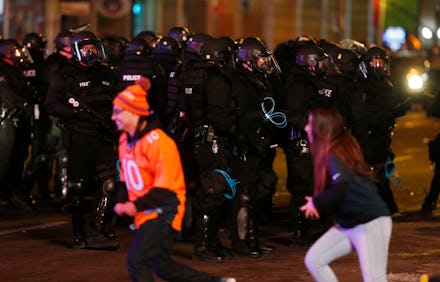Notice This Racial Double Standard in the Coverage of These Rioting Denver Broncos Fans?

The Denver Broncos won Super Bowl 50 on Sunday night, leading tons of fans to go out into the streets to celebrate. But some got rowdier than others, and in this case, some did what can only be described as riot. By night's end, at least a dozen were arrested in the melee:
It's not the first time that sports fans have rioted after a big victory.
But when Americans decide to riot in celebration, they get slapped on the wrist. When black people riot as an extension of their frustration with state violence, they get lambasted in national media and hit with even more punitive public policy. They're "animals" or "losers," in the words of Kevin Sorbo, the white actor who criticized Ferguson protesters.
Take a look at just a few examples:
In 2010, after the San Francisco Giants won their first World Series in more than 50 years, fans took to the streets and caused mayhem:
And then again after the team won in 2014:
In 2011, the Vancouver Canucks lost the Stanley Cup hockey championship and poured out into the streets in Canada, where dozens were arrested and injured:
In 2015 Ohio State University's football team won a college championship, which led to a night in which firefighters had to put out almost 90 fires:
In each instance, the violence was more or less written off by the public at large. At worst, it was just poor decision-making by overzealous fans.
But it wasn't in Baltimore, after Freddie Gray was killed by police:
Or Ferguson, after Mike Brown was shot dead by Darren Wilson:
Or Brooklyn, New York, after 16-year-old Kimani Gray was killed by police:
Or Oakland, California, after video of Oscar Grant's death at the hands of a transit officer went viral:
It seems like violence is OK if it's a celebration, but not if it's a struggle.